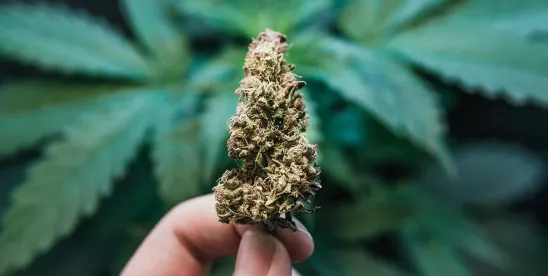Three significant bills, Senate Bill 535, Senate Bill 265, and House Bill 607, have been introduced during the 2025 North Carolina legislative session, each of which could fundamentally reshape the state’s regulatory landscape for hemp-derived products.
At Ward and Smith, we are closely monitoring these developments to help our clients with the potential impacts on their businesses. Below is an overview of what stakeholders in the hemp industry need to know about this proposed legislation.
Overview of Proposed Legislation
Senate Bill 535 ("S535"): "Regulate Hemp-Derived Beverages" focuses on nonalcoholic hemp-derived beverages. The bill amends the definition of "alcoholic beverage" to exclude hemp-derived beverages and also amends the definition of "malt beverage" to include hemp-derived beverages. This creates a regulatory framework for these products under the existing ABC system while maintaining their nonalcoholic status. One offshoot to consider, especially for product manufacturers who subcontract out their wholesaling to third parties, is that this law (if adopted) would seemingly subject nonalcoholic hemp-derived beverage products to our state's beer franchise wholesale laws.
Senate Bill 265 ("S265"): "Protecting Our Community Act" establishes a comprehensive regulatory framework for hemp-derived consumable products more broadly, utilizing the Alcohol Law Enforcement (ALE) Division but placing regulatory authority with the Department of Revenue and creating extensive licensing requirements, testing standards, and sales restrictions. This bill also explicitly prohibits hemp products from school grounds.
House Bill 607 ("H607"): "Regulate Hemp Consumable Products" parallels S265 in scope but designates the ALE Division of the Department of Public Safety as the regulatory and enforcement authority and includes even more detailed testing requirements.
Regulatory Authority
Perhaps the biggest difference among these bills is the designated regulatory authority.
S535 grants regulatory authority to the North Carolina ABC Commission, placing hemp-derived beverages within a similar scheme as alcoholic beverages. This approach utilizes existing alcohol regulatory mechanisms for hemp-derived products.
S265 designates the North Carolina Department of Revenue as the primary regulatory authority for all hemp-derived consumable products, suggesting a taxation and commercial licensing approach to regulation.
H607 appoints the ALE Division as the regulatory authority, emphasizing law enforcement aspects of regulation and compliance for hemp-derived consumable products.
These differences indicate that legislators are still determining who is best positioned to regulate hemp products in our state. For those in the industry, the designated authority would substantially impact the regulatory relationship, compliance processes, and enforcement dynamics they would face.
Definitions and Product Categories
Each bill defines hemp-derived products, but with some variations:
S535 introduces "hemp-derived beverages" as nonalcoholic beverages containing hemp that may contain concentrations of hemp-derived cannabinoids. It amends the definition of "malt beverage" to include hemp-derived beverages, creating a pathway for distribution through existing alcohol beverage channels.
S265 and H607 both define "hemp-derived consumable products" more broadly as products intended for human ingestion or inhalation containing no more than 0.3% delta-9 THC but potentially higher concentrations of other cannabinoids. Both exclude topical applications and seeds or seed-derived ingredients generally recognized as safe by the FDA.
All three bills define "hemp-derived cannabinoid" similarly, encompassing various phytocannabinoids found in hemp (including delta-9 THC, delta-8 THC, delta-10 THC, CBD, and numerous others), as well as synthetic cannabinoids derived from hemp.
Licensing Requirements and Fees
The comprehensive bills (S265 and H607) establish licensing requirements and fee structures:
- Manufacturers would face a $15,000 license fee, though this would be reduced to $1,000 if the applicant's gross income was less than $100,000 in the prior year.
- Distributors would pay $2,500, reduced to $750 for those with gross income under $100,000.
- Retailers would be charged $250 per location or website, with a $5,000 cap for entities with more than 25 locations or websites.
- Qualifications for licensure include being at least 21 years old, having no felony convictions related to controlled substances within 10 years, consenting to inspection, and being current on state tax obligations.
S535 doesn't establish a separate licensing scheme but would likely require hemp-derived beverage businesses to obtain proper commercial and retail ABC permits, similar to those currently required in our state for alcoholic beverage producers, wholesalers, and retailers today.
Testing Requirements
Testing requirements are another significant variation between the bills:
H607 contains exceptionally detailed testing requirements, listing 100 specific substances with precise maximum thresholds for each. This creates the most stringent testing requirements of the three bills.
S265 requires testing for cannabinoids, heavy metals, mycotoxins, pesticides, residual solvents, and other controlled substances identified by the ALE Division, but doesn't specify detailed thresholds like in H607.
S535 grants the ABC Commission authority to set standards and testing requirements for hemp-derived beverages, but doesn't specify particular substances or thresholds.
These differences would significantly impact manufacturing processes, quality control costs, and potentially product formulations, with H607 creating the most extensive burden.
Product Restrictions
All three bills establish restrictions on product content, packaging, and marketing:
Age restrictions are consistent across all three bills, prohibiting sales to anyone under 21 years old and requiring age verification.
S265 and H607 include packaging and labeling requirements (child-resistant packaging, warning statements, ingredient disclosure, cannabinoid content labeling) and prohibit marketing that appeals to persons under 21.
Potency limits differ between the comprehensive bills. S265 allows up to 75mg of specified cannabinoids per serving for non-liquid products and 25mg for liquid products, while H607 is more restrictive at 25mg for non-liquid and 10mg (with a 100mg package maximum) for liquid products.
Enforcement and Penalties
S265 and H607 establish civil and criminal penalty frameworks for violations, with escalating consequences for repeat offenses:
- First violations typically result in civil penalties of no more than $500.
- Subsequent violations increase the financial penalties and can lead to license suspension or revocation.
- Criminal penalties are established for certain repeat violations, typically constituting Class A1 misdemeanors and potentially Class H felonies for multiple offenses.
Looking Forward
It is currently uncertain whether any of these bills will advance during this legislative session. However, they provide valuable insight into how members of the North Carolina General Assembly are approaching the regulation of the state’s hemp industry.




 />i
/>i
